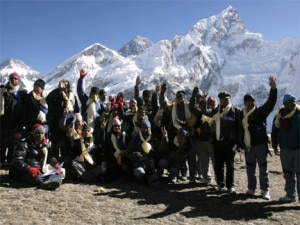Int’l Mountain Day: Mountains now a global concern

KATHMANDU, Nepal – Climate change is a global problem in the mountainous region. And the problem has also gripped the mountains of Nepal in some or the other way. The mountains and its problems are now not only the concern of local residents but all the seven billion plus population of the world have common concern and shared the common interest on mountains. Amidst the same fear and concern, the global community is observing the International Mountain day on Wednesday December 11.
About 12 percent of the world population inhabit at the mountain area that covers about a quarter of total area of the earth. In Nepal a major junk of people lives in the mountain terrains and all most all are dependent to the mountain resources for their living directly or indirectly.
Since the early 20th century, Earth’s mean surface temperature has increased by about 0.8 °C (1.4 °F), with about two-thirds of the increase occurring since 1980. According to the Wikipedia, warming of the climate system is unequivocal, and scientists are 95-100% certain that it is primarily caused by increasing concentrations of greenhouse gases produced by human activities such as the burning of fossil fuels and deforestation. These findings are recognized by the national science academies of all major industrialized nations, the online encyclopedia stated.
It has been revealed that the climate of mountain region in Nepal is increasing by 0.06° C every year. The number is 0.04 ° C in the Terai while the himalayan districts Manang and Mustang witness 0.09° C rise in the temperature. Climate change experts are worried with these facts.
And the problem is not only of Nepal but the problem of climate change in the mountain region has emerged as a major difficultly for all.
Experts say that the effects of climate change can be seen in the regions with emergence of new diseases in crops, water sources getting dry, low yielding due to unseasonal rain among others.
Scientists believe that thawing of the ice is creating glacial lakes that threaten mountain communities if they burst and flood downstream. The disappearance of the Himalayan glaciers would also bring drought to large regions of Asia, where around 1.3 billion people depend on rivers stemming from the mountain region.
According to a study by the Asian Development Bank, climate change will, “cause faster melt and retreat among Nepal’s 3,252 glaciers”, “affect agricultural production and yield”, and increase the, “risk of malaria and encephalitis”.
Mountain regions in Nepal are the important place habituating different endangered wildlife, bird and the important place for medical herbs and food stuffs. But due to adverse effect of the climate change and global warming the ingenuousness of the region is disappearing slowly. Snow-capped mountains are turned to black hills and glacier rivers increasing their flow.
International communities are also supporting Nepal in its endeavor in battling climate change, food security, livelihood of local residents, bio-diversity conservation and development of mountainous areas.
International Centre for Integrated Mountain Development (ICIMOD) has launched several programmes to maintain the harmony among the environmental, economic and social development in Hindukush Himalayan region.
As the mountains in Nepal are at high risk due to the climate change and global warming, a joint collaboration between the mountain countries is must to tackle the problems, said Dr. David Moldenale, Director of ICIMOD. He urged for a special plan from the policy makers as the problem has been emerging rapidly affecting the mountain people in general.
And experts say, without the overall development of socio-economic and environmental aspects of the region, development of the country is impossible.

